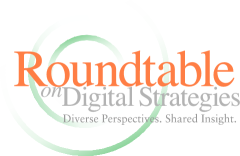
 |
|


Business Intelligence
and Analytics
Roundtable on Digital Strategies
June 2, 2010
CIO's and their associates from Bank of America, Colgate, DISA, Eaton, IBM, Lowes, Mckinsey & Company, Time Warner Cable and Thomson Reuters joined academics in this Roundtable hosted by Time Warner Cable in North Carolina.
![]()
Topic Statement Participant List Overview |
|||||
We live in a world inundated with data. Perhaps because of the universal availability of information and the global nature of business, many of the traditional sources of competitive advantage have disappeared. It has become harder and harder to stand out from the crowd, and yet more important than ever. Probably one of the best ways left to differentiate yourself is through excellence in execution, simply outperforming your competitors and making better decisions on the business processes most important to your industry and/or your company. One way of enabling this is through making better use of business intelligence—the ability to collect, aggregate, store, mine, analyze and report/make available key data. Some argue that this has never been as important as today and can make or break an enterprise.
Our discussion focused on what areas in the company business intelligence can have the most impact, and how. We also discussed the organizational implications and impact of increased focus in this area, and what kind of resources it takes to get the desired results. Some of the questions we addressed include:
- How are you using business intelligence in your corporation at present? Where are you using it well and where not? Where is it really key?
- Is the use of business intelligence largely in external downstream facing processes and functions? In which areas: customer experience/service, marketing, sales, merchandising? Or upstream around supply issues: inventory, supplier/vendor ratings? Or tying these together to enable better CPFR (collaborative forecasting, planning and replenishment)?
- Can it be just as important internally? Should it be? Is it today? In which areas: financial, HR, asset usage/reporting, etc.?
- How do you organize to support BI efforts? Centralized, decentralized, some other model? Is this an integrative discipline, or best left to serve each distinct need?
- To what degree do you focus first and foremost on the “distinctive capabilities” of the firm that could be enhanced through good data collection, reporting and analytics (as opposed to using BI where it is easiest or most obviously fruitful)?
- How can you make business intelligence and analytics more predictive—i.e. more “front windshield” and less “rear-view mirror”? Is that possible and what are the keys to doing so?
- Can social networking applications be a part of the data gathering and how do you analyze, report and integrate what is gathered?